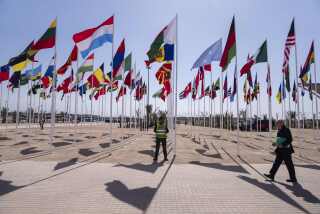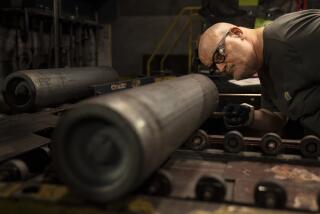Soviet Economy Likely to Get Worse, U.S. Says : Assessment: Intelligence agencies foresee more inflation and shortages despite Gorbachev’s reforms.
- Share via
WASHINGTON — The Soviet Union’s economic plight reached “near-crisis” proportions last year and is likely to worsen, forcing Moscow to continue cutting its military spending significantly, America’s top intelligence agencies said Friday.
In their annual report to Congress, the CIA and the Pentagon’s Defense Intelligence Agency predicted that the Soviet economy would “stagnate or decline slightly” this year, and could collapse in the face of strikes or ethnic unrest.
They said that Soviet citizens are likely to experience continued hyper-inflation and widespread shortages of meat, sugar, soap and other consumer goods. And they said Soviet President Mikhail S. Gorbachev’s reform efforts have failed to provide hope that the situation will ease.
At the same time, deputy CIA director John Helgerson said that no matter how the economy performs, Moscow is “almost certain” to make further reductions in military spending through 1991. He said Moscow now seems “firmly committed” to converting industry to civilian use.
The assessment, compiled each year for Congress’ Joint Economic Committee, appeared likely to bolster assertions by some lawmakers that the United States should trim its own defense spending more rapidly in response to the diminishing Soviet military threat.
Sen. Jeff Bingaman (D-N.M.), chairman of the panel’s subcommittee on national security, said the agencies’ findings “paint a different picture than one gets from statements by some Administration officials who have argued that Soviet defense spending is still growing.”
Bingaman was referring to Defense Secretary Dick Cheney, who has contended that Congress should move cautiously in trimming the defense budget. Cheney has argued that while Moscow has cut spending on conventional weapons, its outlays for long-range weapons are rising.
Cheney has been feuding openly with CIA director William H. Webster over the question. Friday’s report, written partly by Cheney’s own DIA, could undercut the secretary’s position to some extent.
The 79-page report, replete with CIA statistics on the Soviet Union’s economic health, chronicles a Soviet economy that is mired in recession, hobbled by shortages and unable to fulfill Gorbachev’s promises for a better life for ordinary citizens.
It warns that the Soviet economy is now so “unstable” that it easily could collapse in the face of a large shock, such as a prolonged strike or widespread civil unrest. “A single major event could lead to a substantial drop in output,” the document says.
The report cites several reasons for the poor performance of the Soviet economy in 1989:
Moscow’s abandonment of much of its old central-planning apparatus before market-oriented “economic levers” were in place.
Soviet ineptness in carrying out the economic reform package that Gorbachev announced in 1987.
Helgerson said in separate testimony that last year’s economic performance in the Soviet Union was “abysmal . . . the worst since Gorbachev took over.” He said the reforms that Gorbachev has adopted so far have not gone “far enough.”
At the same time, Dennis M. Nagy, acting deputy director of the Defense Intelligence Agency, gave the Soviets high marks for fulfilling promises to reduce military spending significantly.
Nagy said the Soviets “are well on their way” to accomplishing the unilateral troop withdrawals and conventional arms cuts that Gorbachev announced in 1988. At least half the promised reductions in tanks and about 75% of the artillery and aircraft cuts have been made.
In addition, he said, Gorbachev also “is carrying out his pledge” to reduce and restructure Soviet forces on the country’s southern and eastern borders, thus easing concerns by China about the Soviet military presence in Asia.
Nevertheless, Nagy expressed dismay that the Soviets are storing much of the more-modern military equipment that they have withdrawn, rather than destroying it, as Western policy-makers had hoped.
And he noted that Moscow has maintained “extensive stockpiles” of munitions and materiel in Eastern Europe despite troop withdrawals from that region. But he expressed confidence that this, too, might soon be reversed.
The agencies offered far more optimistic assessments of the prospects for the economies of the newly emerging East European democracies, which generally have embarked on more radical economic reforms than Moscow has been able to push through.
Helgerson praised the political changes in Eastern Europe, noting that they have left the former Soviet Bloc with almost entirely new leadership throughout the region. “What a difference a year makes!” he told the committee.
At the same time, he said that “the road to economic recovery . . . will not be an easy one” for Eastern Europe. Not only must the new democracies put their economic houses in order, they also must dismantle the economic structure the Communists built.
In their assessment of the Soviet economy, the two agencies expressed considerable skepticism about the new economic reform plan that Gorbachev unveiled last month, warning that it contains “major flaws” that “could give rise to new and serious problems.”
More to Read
Sign up for Essential California
The most important California stories and recommendations in your inbox every morning.
You may occasionally receive promotional content from the Los Angeles Times.











